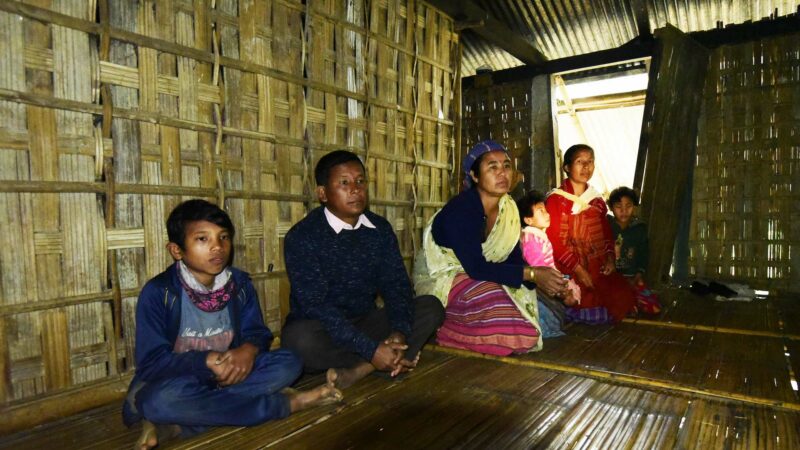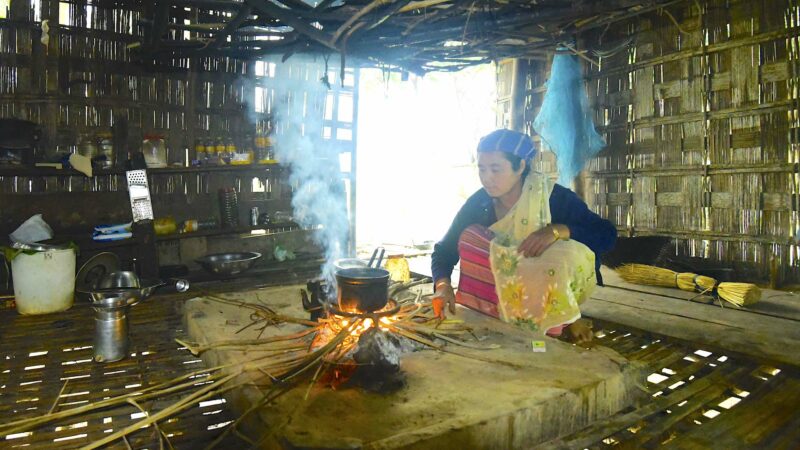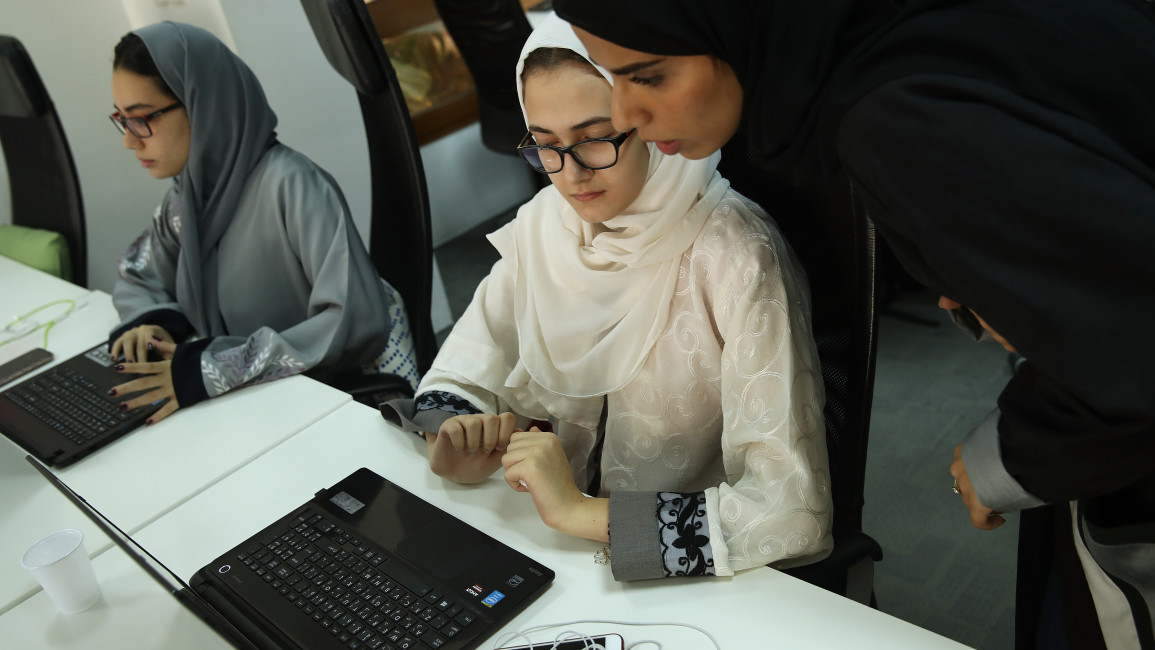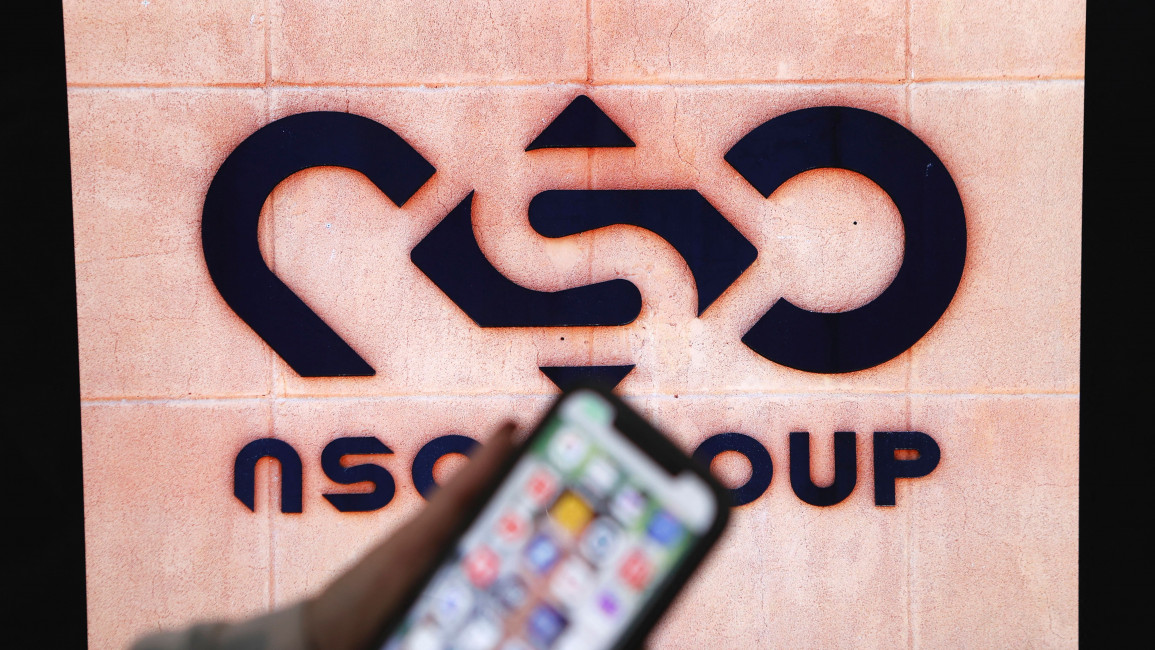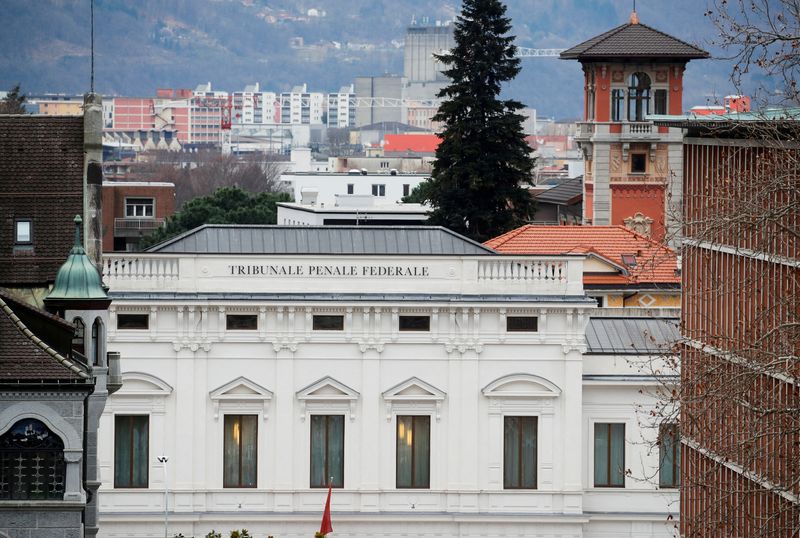India's Mising tribe lives in traditional flood-resilient homes to adapt to climate change

Sogunpara, a typical Mising village in the Jorhat district of Assam, featuring chang ghar or traditional houses on raised platforms. Image by the author.
(The interviews in this story were conducted in-person as a part of field research between October and December 2021)
India’s northeastern state of Assam is the most impacted by climate change in the country, due to flash floods and erosion. The second-largest tribe of the state, the Mising (who make up 17.8 percent of the state’s population) are amongst the worst affected as they live on the banks of the Brahmaputra River and its tributaries. However, they manage to survive in their unique and traditional flood-resilient houses called chang ghar in Assamese, perched above the ground on bamboo stilts.
The word “mising” means man (mi) of the water (asi), and those who live on the mainland call them “river people.” As they live in low lands near the river, the Mising's homes can easily be inundated during tides or swept away by floods.
Inside a traditional chang ghar
Chang ghar are built on a raised platform supported by bamboo stilts, which can keep floodwaters at bay.
Sogunpara in Jorhat district is a typical Mising village, about 300–500 metres away from the Brahmaputra River. “Each time when its water level rises during floods, we become the most vulnerable,” says Nandi Mili, who owns a chang ghar in the village.
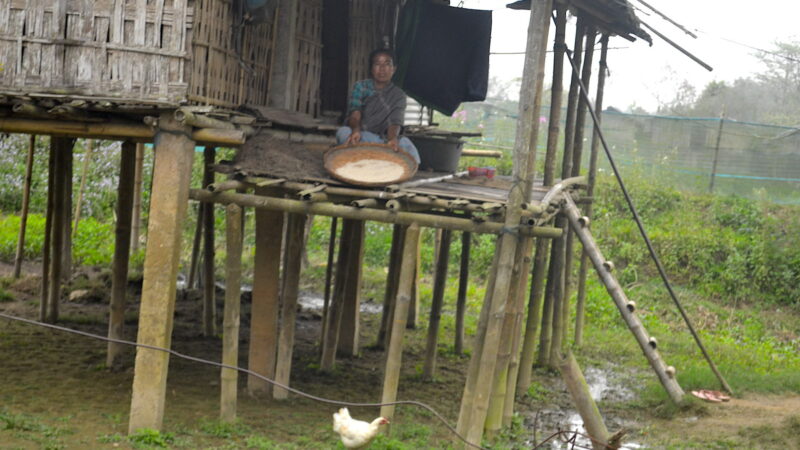
Chang ghar above wooden stilts with a jokhola or auspicious ladder for entering. Image by the author.
Flanked by similar houses around, it stands at about 8 feet above the ground. This height of the floor, according to Nandi, indicates the level the last flood reached in the locality. The villagers mark this height on the poles of their homes, based on which they raise their floors during the next repairs.
A wooden ladder locally called a jokhola leads to the raised entrance of the house. It is an important element of the community’s home on which rest some of their social beliefs. “A jokhola has either five or seven steps as these numbers are considered auspicious by us,” explains Nandi’s wife Lotika.
According to Mising traditions, the arrival of a new bride in their household calls for the setting up of a new jokhola. Rituals and ceremonies in the presence of village elders mark her climbing up this jokhola, to enter the house for the first time. “This is believed to make the marriage long and happy,” Lotika says.
The jokhola outside Lotika’s chang ghar has five steps leading to the entrance through a rectangular porch or verandah. The room at the entrance is almost bare, with a few chairs laid out for visitors. The walls of the house are made of interwoven bamboo or cane.
“We use neither mud nor cement in our construction, to minimize damages to our houses due to recurrent floods. Further, cane and bamboo are easily available natural resources in patches of wilderness near our village; hence rebuilding our homes becomes easy and cost-effective with them,” says Nandi.
The floor of the house is lined with long and thick bamboo strips, and conveniently bears the weight of the household items and members. Its variable height is one of the unique highlights of a chang ghar’s flood resilient strategy. “Another important aspect of this coping strategy is whenever possible, we can undo these bamboo structures, load them on boats etc. and keep them on highlands or raised platforms, to fix them back, after the floods are over,” says Nandi.
The chang ghar‘s special kitchen
The centre of the house has a kitchen and fireplace — this is typically designed to endure floods. While lighting the hearth, Lotika says it is locally called “meram,” and it also keeps the house warm among the cold winds of the river banks. But most importantly, this part of the house has certain traditional food storage mechanisms both for daily and emergency use during floods. They are rectangular bamboo shelves (about 4 feet by 3 feet) suspended with ropes from the ceiling at optimum heights over the fireplace.
About 4 feet above the meram hangs the first shelf, called “perab,” over which there is another, known as rabbong. Since the perab is directly above the fireplace, it is also used to smoke raw fish and meat or to dry paddy during the rainy season. Daily household items such as utensils and firewood are also stacked there.
Rabbong is very special for the community as it stores pitchers of the traditional Mising rice beer apong, especially in winter to keep it warm and prevent it from getting sour. In summer, however, these pitchers are placed on the floor of the chang ghar to keep them cool.
There is another topmost shelf close to the kitchen’s ceiling called the “kumbang.” This is used to store vegetables like potatoes, pumpkins, gourds, onions, garlic, etc.
According to Nandi, since these layers are directly over the fireplace, the smoke and the heat keep bacteria and fungi out of the stored items. Further, the thatched roof also keeps the items in the kumbang cool.
For emergency and livestock protection
Additional storage space is often created with bamboo mats below the ceiling of their room at the entrance. Here, bags of paddy, vegetable seeds and other essentials are stored to protect them from floods and set aside to be used during emergencies. “Our community is perpetually ready to evacuate their homes since floods today are more sudden and recurrent,” says Lotika.

Livestock that forms an important part of Mising household is kept in the basement of a chang ghar. Image by the author.
In the space below the house or the open basement, flanked by the bamboo stilts, few pigs laze in the morning sun. This part of the house is occupied by the family’s livestock, which occupies an important place in the lives of the local communities. Certain homes in the village have also constructed a raised platform close to their homes where their cattle take refuge during floods.
Replications of traditional tribal housing
A few houses away from Nandi’s, there is a chang ghar with an interesting variation. Its supporting bamboo stilts have been replaced by cemented pillars and the usual thatched roof substituted with asbestos sheets. “Though such modifications in building materials are expensive and very few in the village can afford, yet the basic flood resilient adaptations within the house remain the same,” points out Nandi.
This traditional concept of chang ghar is being replicated in flood-hit villages by local grass-root based non-profits such as North East Area Affected Development Society (NEADS) with the help of indigenous youth clubs and disaster management committees. “We particularly want to incorporate their traditional ideas and climate adaptation strategies adopted on shelter management, put together with our innovative practices under the organisation’s post-flood rehabilitation and reconstruction programme,” says Tirtha Prasad Saikia, Joint Director, NEADS. Nearly 250 homes have been constructed in 25 villages in the districts of Jorhat, Golaghat and Sibsagar, during the past 6–7 years.

A Mising community member flaunts the chang ghar design on his traditional attire. Image by the author.
The local villagers are paid for their labour during construction work. The former also provide bamboo, cane and other locally available materials required for construction in their villages. “These homes are distributed to beneficiaries free of cost, selected through community-based consultations with village groups including their heads and elders,” says Saikia.
Chang ghar, however, is a special survival strategy of the Mising community only. Other tribes that live away from the river banks do not use stilted homes; they live in ordinary huts.
